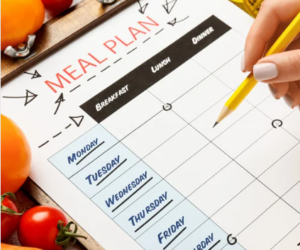Posts on Happily Homegrown contain affiliate links. When you make a purchase through an affiliate link, your price will be the same, but Happily Homegrown will receive a small commission. Thank you for your support!

When it comes to managing a household, one of the most stressful parts of the week can be deciding what to cook for dinner every day. With busy schedules, unexpected events, and growing grocery lists, it’s easy to fall into the habit of last-minute decisions or ordering takeout. But there’s a simple solution that can help eliminate the stress and save you time and money, and even reduce food waste: menu planning.
Why Menu Planning Matters
Menu planning goes beyond just deciding what to eat. It’s about creating a strategic plan that helps you take control of your week in the kitchen. Here’s why menu planning is worth the effort:
- Saves Time
Instead of staring into your fridge every evening wondering what to cook, you already have a plan. This means less time spent deciding and more time spent enjoying your meal. Plus, you can prep ingredients ahead of time, saving even more time during the week. - Reduces Stress
Having a menu for the week takes the guesswork out of dinner time. Whether you’re cooking for a family or just yourself, knowing exactly what you need to make helps ease the pressure of coming up with something at the last minute. - Saves Money
Menu planning helps prevent impulse buys and food waste. When you plan your meals in advance, you can make sure you’re only buying what you need. Plus, you can find ways to use ingredients across multiple meals, ensuring everything gets used up. - Promotes Healthier Eating
When you have a set plan, you’re more likely to incorporate healthier, homemade meals instead of relying on processed foods or takeout. Plus, you can tailor your meals to include nutritious, seasonal produce that benefits your health and supports local farmers. - Creates Family-Friendly Rituals
For families, having a meal plan creates a sense of routine. Kids can even get involved in choosing the meals for the week or help with prep, making mealtime more enjoyable and giving everyone a role in the kitchen.
How to Get Started with Menu Planning
If you’re new to menu planning, don’t worry—it’s easier than you think. Here are some simple steps to get started:
1. Assess Your Week
Take a moment to look at your upcoming week. Do you have any nights when you’ll be too busy to cook? If so, plan for something quick or consider preparing meals ahead of time. You can also use leftovers from earlier in the week to simplify things.
2. Choose a Theme for Each Day
Sometimes, deciding on specific meals can feel overwhelming. Simplify your planning by creating themes for each day. Here are a few examples:
- Meatless Monday – Focus on vegetarian or plant-based meals.
- Taco Tuesday – Taco night can be a fun tradition for the family.
- Soup & Salad Wednesday – Keep it light and healthy.
- Pasta Thursday – A hearty pasta dish is always a crowd-pleaser.
- Family Favorites Friday – A “fun” meal like homemade pizza or burgers.
3. Make Your Shopping List
Once you’ve planned your meals, make a detailed shopping list. This will help ensure you only buy what you need, which will save money and minimize food waste. Group the list by category (produce, dairy, etc.) to make your shopping trip even faster.
4. Prep Ahead When Possible
If you have the time, take some time on a weekend or during a quiet moment to prep ingredients ahead of time. Chop vegetables, marinate meats, or make sauces in advance. This small step can make your evenings less hectic.
5. Stay Flexible
Life happens. Sometimes plans change. If you’re too tired to cook or something unexpected comes up, switching things around is okay. The goal is to reduce stress, not add more!
Tips for Success
- Incorporate Leftovers – Plan meals that will generate leftovers so you can have lunch the next day or simply repurpose ingredients for a different dish.
- Shop Smart – Look for seasonal ingredients, sales, and discounts. Take advantage of bulk buys for pantry staples like grains, beans, or pasta.
- Use Technology – There are plenty of apps and websites available to help with meal planning and grocery shopping. Consider using a meal planning app to streamline the process.
- Get the Family Involved – Let everyone pitch in with meal ideas or help with the cooking. It’s a great bonding experience and can make the process more enjoyable.
Conclusion
Menu planning may take some time to get into the groove, but once you do, you’ll be amazed at how much more manageable and enjoyable your week can be. It helps you take control of your meals, save money, reduce food waste, and ensure that your family is eating healthy, delicious food.
So, why not give it a try? Start small by planning just a few meals each week; before you know it, menu planning will become second nature. We’d love to hear about your menu planning strategies and any tips you’ve found helpful. Share them in the comments below!
Happy planning and happy cooking!






 Benefits of Secular Homeschooling
Benefits of Secular Homeschooling
Leave a Reply